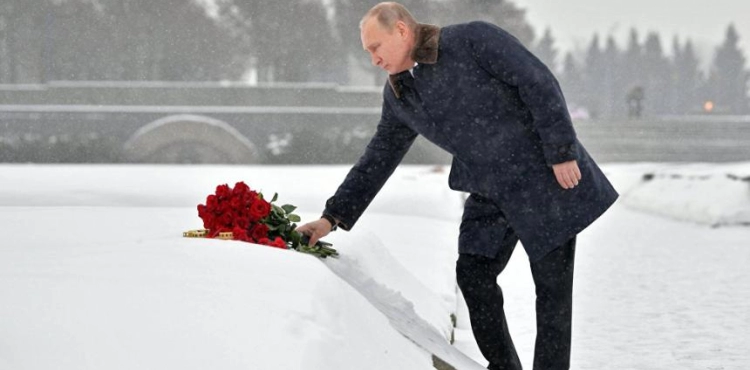Russian President Vladimir Putin on Sunday hailed the historic resilience of the city of Leningrad to the Nazis, describing it as a "fortified city" during the celebrations in St. Petersburg in commemoration of the 75th anniversary of the end of the siege of the city, which caused the death of 800 thousand people. The lowest between 1941 and 1944.
At a concert held Sunday in the city of St. Petersburg, Putin said there was no forgiveness for the Nazis who tried to kill this "fortified city" starving through a suffocating siege imposed on it, and tasted its inhabitants "terrible suffering".
"The enemy was planning to wipe out Leningrad from the map," said Putin, who did not attend the military parade. "What happened was a crime against humanity."
The military parade, which took place in a snowy atmosphere in front of the Hermitage museum in the center of the former Russian capital, provoked controversy, especially after many saw survivors of the siege as a model of military propaganda by the authorities.
In front of hundreds of people present, at 11 degrees below zero, more than 2,500 soldiers, some wearing sheepskin coats and shoes like those worn by Nazi-era soldiers, and the famous T-34 tanks and rocket launchers, passed through.
A minute of silence followed a device that was warning residents of imminent aerial bombardments.
"It´s a celebration for the city and for the whole country," said Ivan Kolukultsiv, 45, president of the company. "We have to remember and commemorate people."
The population of Leningrad was 3 million before the war, more than 800,000 of them died of hunger, disease and bombardment during the 872-day Nazi siege. But historians say the number of victims could be greater.
Before the celebrations, more than 5,000 people signed a petition calling on the authorities to cancel the military parade, which was described as a "desecration festival" anniversary.
Some believe that the money used for the show could have been paid to the survivors.
"Older people can buy medicines and clothes to avoid even a few minutes of counting," wrote political commentator Anton Oreich.
"The authorities have not yet completed the complete list of the dead, especially the thousands of soldiers who tried to break the siege and are still considered missing and have never been buried," the petition said.
Kremlin spokesman Dmitry Peskov, who did not want to comment on the petition, said St. Petersburg "is known for its long tradition in the debate." "It is a very important history for the whole country, for all the Russians and for President Putin himself," he said.
Vladimir Putin, 66, was not born during the siege, but his older brother died during the siege. He is buried in the cemetery for victims to be visited by Putin.
Putin´s mother nearly died of starvation during the siege, while his father, who was fighting in the Red Army, was wounded near Leningrad.
Since Friday, the city has seen commemorative activities, including concerts and art shows. On Sunday evening, artillery will fire shots at the city´s liberation.
Some buildings still carry warnings from the Soviet authorities of these raids in a city of five million people who, in their collective consciousness, bear the consequences of this tragedy.
In a joint statement, the foreign ministers of Russia and Germany announced Sunday that Berlin would provide 12 million euros in aid to survivors of the siege of the city and to veterans.
While the columns of monumental historic buildings in St. Petersburg will remain lit, residents, including 108,000 veterans or survivors of the blockade, have been invited to light candles in front of their windows.












